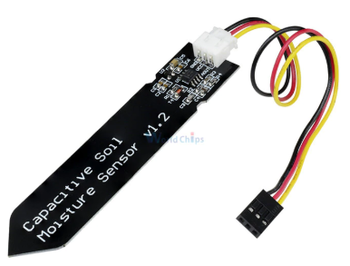SoilHumiditySensor: Difference between revisions
| Line 27: | Line 27: | ||
The software puts a low level on pin D5 (to emulate GND) and a high level on pin D0 (to emulate VCC). | The software puts a low level on pin D5 (to emulate GND) and a high level on pin D0 (to emulate VCC). | ||
The idea is that the current is low enough for this trick to work. | The idea is that the operating current of the probe is low enough for this trick to work. | ||
== Software == | == Software == | ||
Revision as of 12:50, 12 May 2019
| Project SoilHumiditySensor | |
|---|---|

| |
| Investigation of soil humidity sensors | |
| Status | In progress |
| Contact | bertrik |
| Last Update | 2019-05-12 |
Introduction
A number of types of soil humidity sensors exist. Many have the problem that the electrodes corrode.
For example, see this video by Andreas Spiess that compares a couple of types.
References
Hardware
It got these capacitive ones from Aliexpress.
I've connected it up as follows:
- probe GND (black) to Wemos D1 mini pin D5
- probe VCC (red) to Wemos D1 mini pin D0
- probe AOUT (yellow) to Wemos D1 mini pin A0
This way, the wire with the 3-pin connector can simply be plugged into the Wemos D1 mini, without having to modify the cable.
The software puts a low level on pin D5 (to emulate GND) and a high level on pin D0 (to emulate VCC). The idea is that the operating current of the probe is low enough for this trick to work.
Software
See my github repository.
The software takes a measurement at a regular interval and sends it over MQTT.